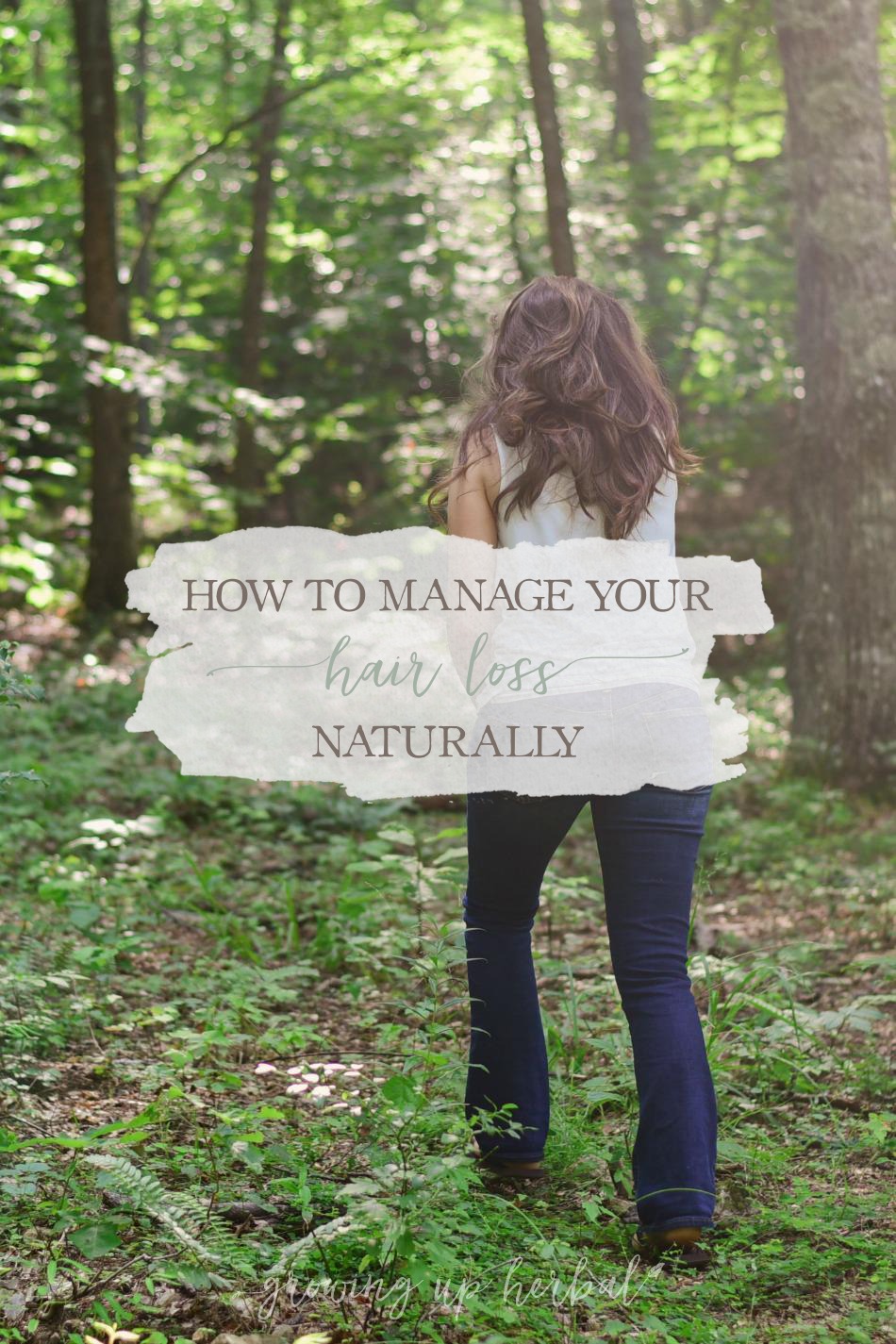
No matter who you are or how you look at it, losing your hair is no fun, but thankfully there are things you can do to manage your hair loss naturally.
That’s right. You don’t have to opt for chemical and surgical options right off the bat. There are some basic, healthy, natural steps you can try first.
Okay, so, I’ve actually never dealt with hair loss in a bad way. Sure, after my pregnancies, my hair seemed to fall out in globs, but that’s a normal response to fluctuating hormones which I’ll be addressing below; however, men, and women, both experience thinning hair and hair loss due to a variety of things. Some things are beyond our control while others are very much in our control.
Today, I want to talk about some common causes of hair loss as well as 5 ways you can manage your hair loss naturally. And yes, I do have some great natural remedies and resources to share with you too!
Common Causes of Hair Loss
Common causes of hair loss vary for men and women but below are some of the main reasons a person can have thinning hair or hair loss.
- Autoimmunity – a result of an overactive immune system where the body attacks the hair follicles; varies from temporary to permanent
- Genetics – referred to as male pattern baldness or female pattern baldness; usually permanent
- Hormones – common during pregnancy, menopause, in aging men, those stopping or switching birth control, those with hypothyroidism or PCOS; due to hormonal changes in the body; temporary if addressed
- Illnesses – stress from illnesses, OTC disorders, skin infections, etc.; varies from temporary to permanent
- Medications – possible with chemotherapy, blood thinners, blood pressure meds, antidepressants, anabolic steroids, and more; temporary
- Nutritional deficiencies – not enough protein, iron, or B vitamins; temporary
- Nutritional excess – too much vitamin A; temporary
- Overstyling hair – damage to hair root from trauma, lack of blood flow, and chemicals; varies from temporary to permanent
- Physical stress – emotional stress, pregnancy, rapid weight loss, loss of loved one, illness, etc.; due to an interruption in hair cycle; usually temporary
- Pregnancy – most common in postpartum period; due to stress or hormone changes; usually temporary
(Gardner, n.d.; Hair loss, n.d.; Worth, n.d.).
How To Manage Your Hair Loss Naturally
If you’ve noticed your hair thinning, breaking easily, or receding, the following 5 areas can be addressed to help you manage your hair loss naturally without the use of chemicals. This natural approach can help minimize or stop hair loss from getting worse, and in some cases, it can encourage hair to grow back full and thick.
The following recommendations are not only for those who are experiencing hair loss but for those who have a full, healthy head of hair as well. These tips and remedies are simply good healthy hair care.
1. Boost Your Nutrition
Nutrition, with most issues, must be addressed first. If your body isn’t getting the nutrients it needs, then the cells in your body (including your hair follicles) won’t be strong and healthy. Eating a real food diet that is free of preserved, processed foods is the first step in any attempt to get healthier.

Here are some tips for improving your diet:
- Eat whole, unprocessed foods, especially vegetables.
- Make sure you’re getting enough healthy fats, including omega-3 fats.
- Decreasing foods that contribute to inflammation such as too many omega-6 fats, too many grains, and too much red meat.
- Take probiotics or eat more cultured/fermented foods; consider herbal bitters before meals.
- Stay hydrated with water and healthy herbal teas; be moderate with caffeine and alcohol intake.
If you need to, take a whole food vitamin mineral supplement. I recommend Garden of Life brand as theirs is the best that I’ve found. It has a wide spectrum of high-quality vitamins, minerals, and other healthy substances that can help your body stay healthy. And remember, vitamins aren’t the only answer. They are only one part of the protocol for healthy hair. It’s unrealistic to expect your hair to be full and thick after only taking a multi-vitamin for a month.
Also, beware of hair growth supplements that guarantee proven results. Many of these are vitamin supplements with extra nutrients the hair needs. If you eat healthily and take a good quality multi-vitamin, chances are you’re already getting much of what these “miracle hair growth pills” are promising you.
2. Manage Stress
Stress is a normal part of everyday life, and in many ways, it can be helpful or motivating when it gives you a boost to get the job done. However, stress can also be harmful to your health with there’s too much of it for too long. When the nervous system detects that you are under stress chemical and physical changes happen in the glandular system, liver, digestive system, and cardiovascular system. Too many changes, too often, can lead to negative results (Stress, n.d.).
Unfortunately, most modern people are chronically stressed. Stress no longer motivates them but negatively impacts their health.
Stress can come from jobs, relationships, responsibilities, family, illness, lack of sleep, weight gain, so on and so forth. As you can see, there’s a lot of reasons one can be stressed, but thankfully, there are some ways you can manage stress in a natural way.
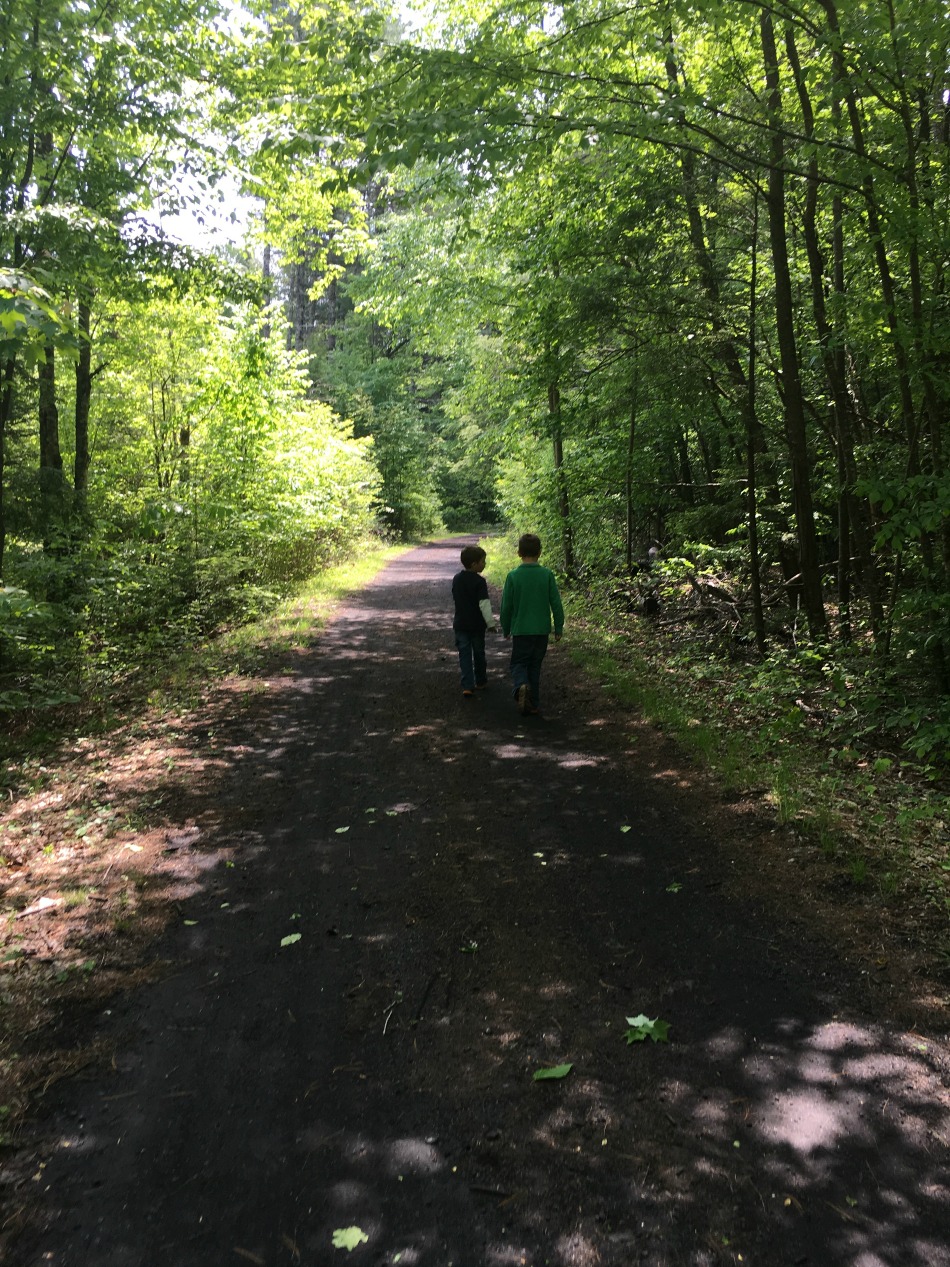
- First, simplify life and relax a bit. Remove some things that are on your plate either by finishing projects or delegating them to someone else. Take a vacation or build some downtime into your day. Think about things you enjoy, that aren’t stressful, and incorporate more of that into your life.
- Next, give deep breathing a try. Deep breathing helps to calm the nervous system’s response to stressful situations which, in turn, stops the negative stress response that can occur throughout the rest of the body. Deep breathing can be done anywhere or through exercises like yoga and tai chi (Relaxation techniques: Breath control helps quell errant stress response, 2015).
- Herbs and essential oils can help, especially those that are soothing to the nervous system and the glandular systems. Nervine herbs and adaptogen herbs are the two categories to look into here.
- Get enough sleep! The amount of sleep one needs will vary, but most experts agree that 7-8 hours of continuous sleep is required for healthy functioning of the body. When you don’t get enough sleep, your hormones can be off balance, you are more prone to illness, and you don’t cope with stress as well (Why Is Sleep Important?, n.d.). Magnesium can be a huge help when it comes to sleep. Most people are deficient in magnesium so it can be a good idea to supplement with capsules or topical magnesium oil (or learn how to make your own here).
3. Minimize Toxins By Switching To Natural Hair Care Products
As you know, toxins are everywhere. In our food, in the dirt and air, in our homes, and in our personal care products. And, as you probably also know, it can take a lot of effort to minimize the toxins we’re exposed to, but it is doable.
Dr. Alan Christianson says there are two kinds of toxins that we need to be aware of. Those that we flirt with (these are the toxins that come and go from our bodies quickly like chemicals in our personal care products) and those we’re married to (these are the toxins that embed in our bodies like heavy metals). Toxins, no matter which they are, negatively impact our health making it harder for our bodies to function properly (Christianson, n.d.).
When it comes to hair loss, toxins, in general, can be harmful as they negatively affect the liver and adrenal glands and therefore hormone function, but the biggest culprits are the toxins found in your store-bought hair care products. These are the toxins we are flirting with.
Thankfully, we can remove these toxins a bit easier and quicker than we can the ones we’re married to by making the switch to natural hair care products.
- Use natural shampoos and conditioners. If you can find a good basic soap to use to wash your hair and as natural of a conditioner (if you use it) to use, that would be best. Just Natural has a line of natural hair care products that are specifically designed for hair loss. You can also find great toxin-free hair care products at Morrocco Method as well. Shampoo bars are great if you’re looking for a DIY, and you can always turn these into liquid soaps if you prefer that.
- The herbal hair rinses are great to use after shampooing to remove build-up, balance pH, and stimulate hair growth, but when it comes to hair loss, it’s best to use them in conjunction with other things like carrier oils infused with herbs and essential oils that are specific for scalp stimulation. Below, you’ll find two great recipes for an herbal vinegar rinse and a scalp stimulating herbal infused hair oil.
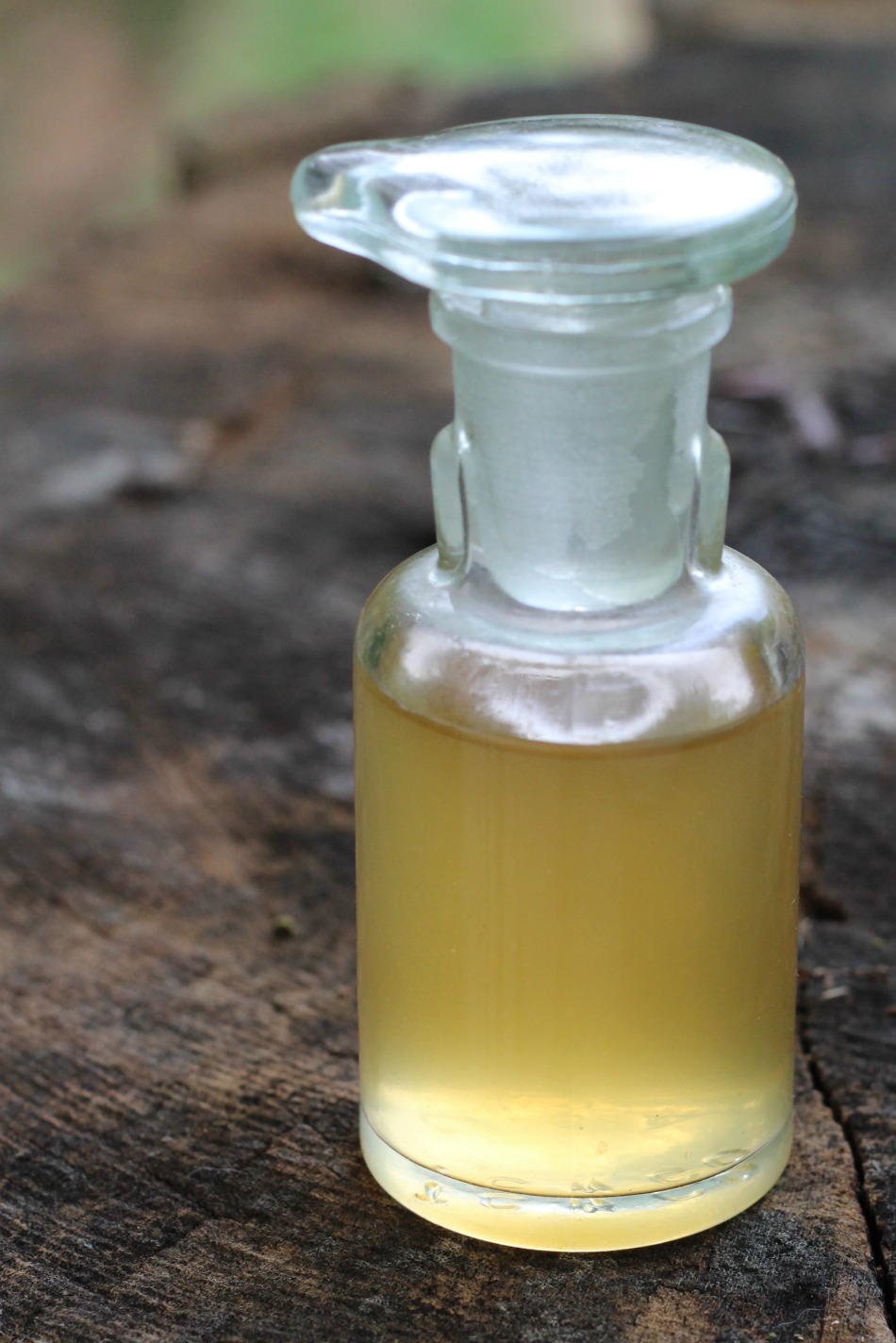
Rosemary Nettle Hair Rinse
Yields 8 uses
Nettle and rosemary are two great herbs to infuse into vinegar and then use as vinegar rinses on your hair. Not only do they stimulate hair growth, but they improve circulation to the scalp which can help with thinning hair too.
Ingredients:
- 1/4 cup dried nettle (1/2 cup fresh nettle – chopped well)
- 1/4 cup dried rosemary (1/2 cup fresh rosemary – chopped well)
- 2 cups apple cider vinegar
- 8 cups water
Directions:
- Combine herbs and vinegar in a glass jar.
- Cover with a plastic lid and infuse for two weeks. Shake daily, if possible.
- After two weeks, strain herbs from vinegar. Bottle, label, and store.
Storage:
Store vinegar in a glass jar or bottle with a glass or plastic lid. Store in a cool, dark location. Will be shelf-stable for 6-12 months.
To Use:
Add 1/4 cup of herbal hair rinse to 1 cup of water. Pour this mixture over freshly washed hair (no need to rinse). Dry and style hair as usual.
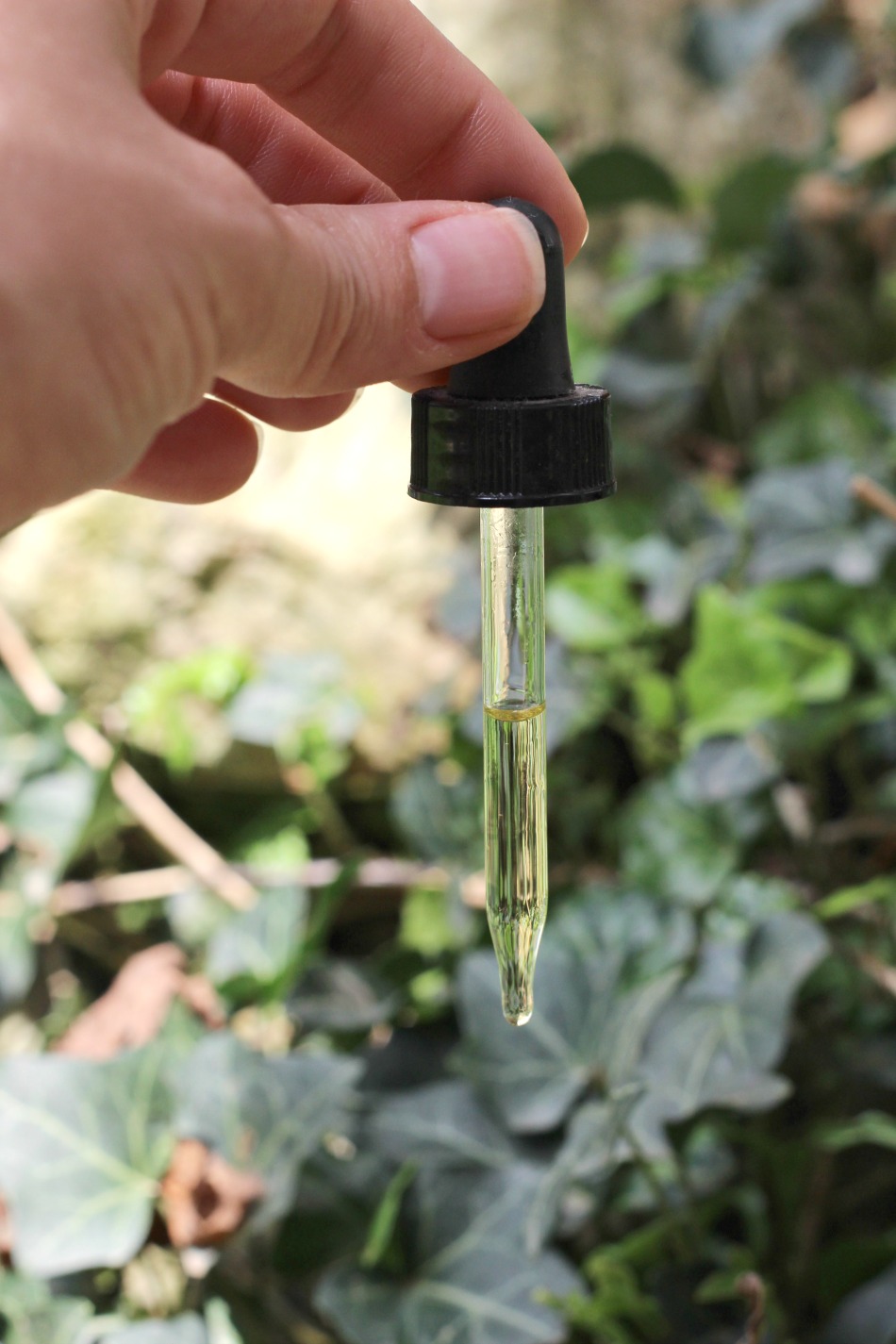
Scalp Stimulating Hair Oil
Oils have been used for centuries to cleanse and beautify the body. Queen Ester and Queen Cleopatra are two well-known examples in history of beautiful women who anointed themselves with precious oils in order to keep their skin beautiful and healthy.
Oils infused with herbs and essential oils are a great way to bring added nourishment and stimulation to the skin and hair, but not just any oils will do.
Ingredients:
- 2 ounces castor oil
- 1 tablespoon black cumin seed oil
- 30 drops of stimulating essential oils (15 drops rosemary (Rosmarinus officinalis), 5 drops clary sage (Salvia sclarea), 5 drops cedarwood atlas (Cedrus atlantica), 5 drops lavender (Lavandula angustifolia))
Directions:
- Combine all ingredients together.
- Mix well before bottling and labeling.
Storage:
Store in a cool, dark, dry location, preferably in an amber colored glass jar with a dropper lid.
To Use:
The easiest way to use this oil is to place 2-3 drops on a toothbrush and slowly massage scalp where areas of hair loss or thinning hair can be seen. This oil is not for your hair, but your scalp. Use small, circular motions, and use more oil as needed. Leave this on for 1-2 hours or overnight. Wash as usual. Repeat every other day for best results.
4. Keep Hormones Balanced
Many times, hormone fluctuations are a normal part of life, (Hello… puberty, pregnancy, and menopause!) but did you know that men go through hormonal changes as they age just like women do? It’s true! It’s called “andropause,” and these hormonal changes, usually centering around testosterone, can cause men to have thinning or receding hair among other things as they age (What Causes Hair Loss? Hair Loss and Hormones, n.d.; Case-Lo, n.d.).
Thankfully, there are ways to balance hormones (and their transitions) in a healthy, natural way.
Again, nutrition, stress, and toxins should be addressed first as these can all affect hormones. However, if addressing these hormonal changes through a healthy diet and lifestyle aren’t enough to help balance the body, there are some other natural options for balancing hormones you can try.
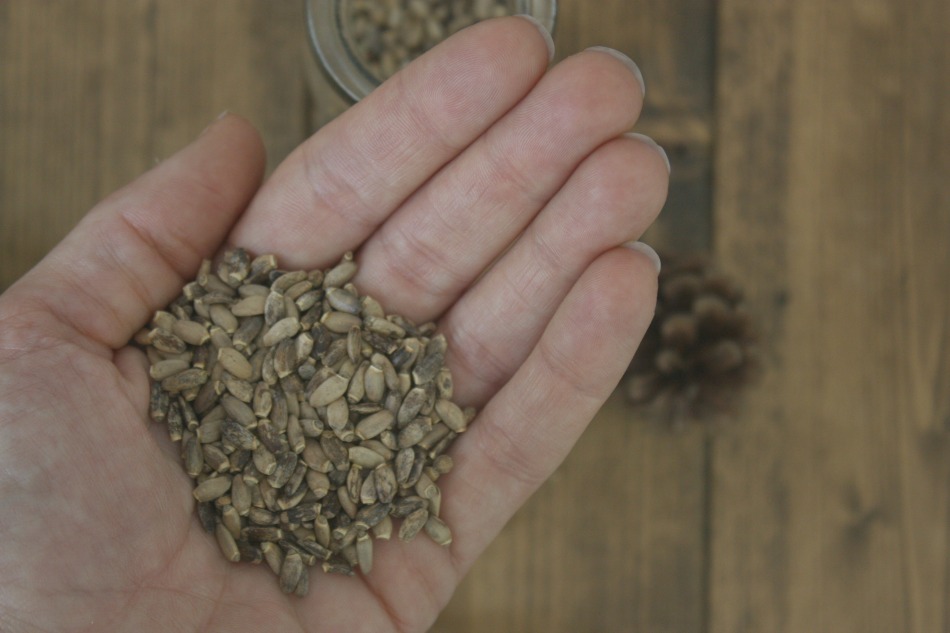
- First, try seed cycling. Not only will this address some nutritional needs in the form of healthy fats and minerals, but it’s also thought to bind excess estrogen as well.
- Next, look to herbs for support. Herbs that block the male hormone DHT such as saw palmetto, stinging nettle root, and pygeum bark (sustainably harvested only) can be beneficial. Adaptogen herbs, as well as herbs that support a healthy reproductive system and liver health, can all be beneficial when it comes to balancing hormones. You can work with an herbalist who can create an herbal formula that can help support healthy hormone function in your body or learn more about the herbs you need on your own. Here is my favorite brand of tinctures for support of the female reproductive system as well as liver support (Hobbs, n.d.).
- Also, make sure you’re getting enough vitamin d. Vitamin d supports healthy hormone function. If you’re not getting enough from the sun or through your diet, consider taking a vitamin d3 supplement. I recommend this one in capsule or spray form. You can also get vitamin d and omega-3 fats with cod liver oil as well.
5. Address Illnesses
Now, there are times where hormone fluctuations aren’t a normal part of life such as during illnesses. For hormone fluctuations due to illness, as well as illness in general, are best managed when you work on dealing with the root cause of the problem (often nutritional or related to some pathogen). As the body overcomes the illness, most times, hair growth will return.
Medications can also contribute to hair loss. Again, eating a healthy diet, minimizing stress, and decreasing toxins is key here as is looking to alternatives such as herbs to help they body overcome sickness and reduce, if not remove, your need for medicines.
Can You REALLY Manage Your Hair Loss Naturally?
As you can see, there are a lot of reasons one may experience hair loss. Some reasons are in your control and others are not. However, you can approach hair loss from a natural perspective and expect good results. The best chance at reversing hair loss (or at least slowing it down) is to evaluate each of the above areas and do what you can to improve them. Boosting nutrition and decreasing stress will go a long way as will minimizing toxins and working to keep your hormones balanced.
Above all, the goal is to keep your body as healthy as you can, despite genetics, in order to manage your hair loss naturally.
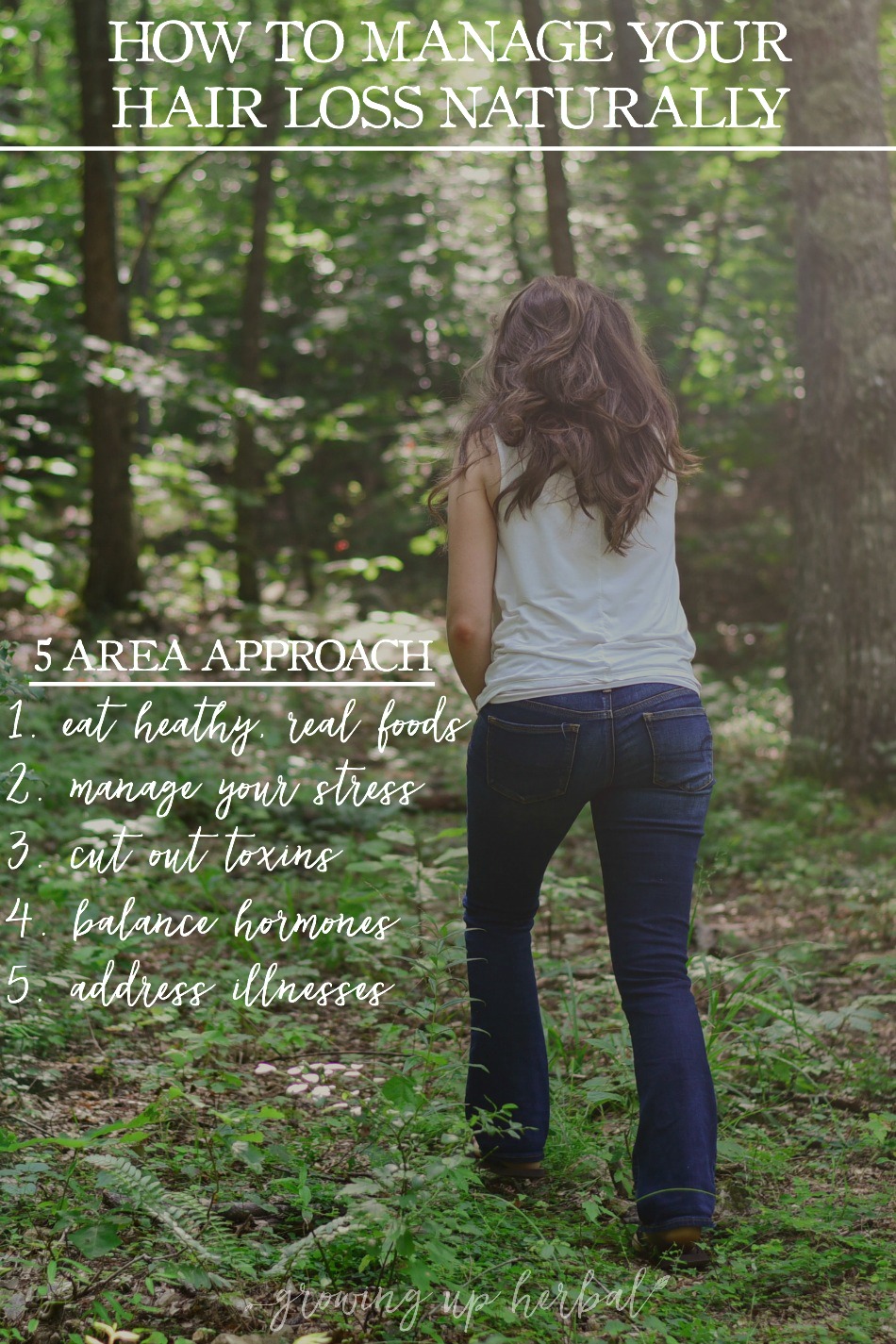
Do you have any stories of successfully restoring a full head of hair naturally? I’d love to hear what you did in the comment section below!
REFERENCES:
- Case-Lo, C. (n.d.). Hair Loss and Testosterone. Retrieved August 19, 2016, from http://www.healthline.com/health-slideshow/hair-loss-and-testosterone#2
- Christianson, A. (n.d.). Toxins. Retrieved August 19, 2016, from http://drchristianson.com/toxins/
- Gardner, A. (n.d.). 21 Reasons Why You’re Losing Your Hair. Retrieved August 19, 2016, from http://www.health.com/health/gallery/0,,20727114,00.html
- Hair loss. (n.d.). Retrieved August 19, 2016, from http://www.mayoclinic.org/diseases-conditions/hair-loss/basics/causes/con-20027666
- Hobbs, C. (n.d.). Hormone Replacement Therapy and Natural Alternatives. Retrieved August 19, 2016, from http://www.christopherhobbs.com/library/articles-on-herbs-and-health/hormone-replacement-therapy-natural-alternatives/
- Relaxation techniques: Breath control helps quell errant stress response – Harvard Health. (2015, January). Retrieved August 19, 2016, from http://www.health.harvard.edu/mind-and-mood/relaxation-techniques-breath-control-helps-quell-errant-stress-response
- Stress. (n.d.). Retrieved August 19, 2016, from Herbal Academy – Intermediate Herbal Course.
- What Causes Hair Loss? Hair Loss and Hormones. (n.d.). Retrieved August 19, 2016, from https://www.bodylogicmd.com/for-men/hair-loss
- Why Is Sleep Important? (n.d.). Retrieved August 19, 2016, from http://www.nhlbi.nih.gov/health/health-topics/topics/sdd/why
- Worth, T. (n.d.). Causes of Hair Loss in Women: Medical Reasons and More. Retrieved August 19, 2016, from http://www.webmd.com/skin-problems-and-treatments/hair-loss/features/women-hair-loss-causes#1
At 48 I have a full very thick head of hair, thankfully. Many women ask me what I use. when I tell them that I have been washing my hair with baking soda and rinsing it with ACV or a rosemary rinse they can’t believe it. It has been almost 8 years now. Once in awhile when I visit a family member I’ll use the shampoo they have available and I hate it. It always leaves my hair with a terrible film and it feels dirty within a day or two. I only wash my hair about once a week unless it has been a sweaty dirty time. It took a bit to get use to the change but after so many years it is the best for me. DIY shampoo bars are also nice once in awhile.
Thanks for sharing, Tammy. It does take a while to get used using natural shampoos, but in the end, it’s totally worth it!
Thank you so much for this post! You have beautiful hair! May I ask? What do you use to shampoo your hair? Do you use shampoo bars? Which one is your favorite? Conditioner? Herbal rinses? What is your routine? Thank you! Hope to hear from you!
Hi, Maria. Thank you for the compliment! I don’t have a 100% natural hair care routine so I’ll be upfront with that, but that’s something I’m working on heavily right now. I have tried a lot of different shampoo/conditioner combos for my hair. They all have pros and cons. You just have to try different ones and see what works best for your hair. You also have to give natural things a bit more time before making an opinion about them. I still don’t feel like I’ve found the right cleanser for me just yet. As far as other things that I do, I do use herbal vinegar rinses from time to time, and I do clay hair masks and hot oil/essential oil treatments sometimes too. Hope this helps!
Megan Thank you for your article on “Managing Hair Loss”. I am not dealing with hair loss, however I have been
picking fresh nettles, and learning about their usage. I saw your hair rinse recipe. The article says shelf stable for 6 to 12 months – Does this need to be refrigerated? Also it mentions glass or plastic lids is there any reason not to use mason jars and mason jar lids?
Thanks
Deborah
No, Deborah. Herbal vinegars don’t need to be refrigerated, but be sure to strain the vinegar through a coffee filter to remove as many herb particles as you can. That will help extend the shelf-life. And, you can’t use a metal lid because vinegar corrodes metal so you either need to put a barrier between the glass and the metal lid (like a piece of parchament paper) or use a plastic lid.
which Garden of life supplements do you recommend. Cause i see they have a wide range of options . I am 35 female with hair loss issues. on second month of seed cycling .
I love Garden of Life and the quality of the products they offer. There are so many you could use, but it really depends on your overall diet and lifestyle. Obviously a good multi-vitamin and probiotic are great places to start. Other than that, I’d recommend vitamin D3 with K2 added if you live somewhere where you’re not outside getting sun all that much. Omega supplements can be good if your diet is lacking in those. As far as other factors that affect hair loss go, women’s hormones can often be the culprit. Again, getting your diet in order, managing stress, and decreasing toxins in your life can be a huge help here. Check out this Natural Hormone Health for Women blog series. It may help you in that regard. I believe GOL has some supplements that are designed for hormone support for women, but I’m not certain. Hopefully, this info is a start for you. Best of luck!